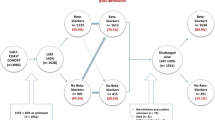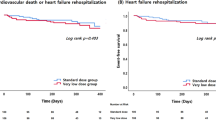Abstract
The aim of this review is to analyze whether there is a need for scientific information about the beta blocker (BB) rebound phenomenon; whether such information is available; and, if it is, how detailed is the BB rebound phenomenon explained in the guidelines and papers? A narrative review is used due to the lack of valid randomized clinical trials (RCTs) on the topic, which are needed for a meta-analysis. The BB rebound phenomenon can have dangerous consequences. The discontinuation of a BB leads to a fourfold increased risk of events related to coronary artery disease in hypertensive patients; it increases in-hospital mortality in heart failure patients; it can precipitate angina pectoris attack; and it increases the risk for death and rehospitalization in patients who survive acute myocardial infarction. Consequently, being considered in the guidelines, the BB rebound phenomenon is believed to be clinically relevant (by experts in the field). This is in sharp contrast with the lack of any additional relevant information about the BB rebound phenomenon in the various important guidelines. For example, we lack a consensus about the precise definition. Moreover, data about the incidence and optimal prevention strategies are lacking for the phenomenon (which is sometimes life-threatening). The BB rebound phenomenon is an additional reason why it is very important to test the prognosis of patients following the cessation of long-term medicaments in RCTs, particularly for BBs.
This is a preview of subscription content, access via your institution
Access options
Subscribe to this journal
Receive 12 print issues and online access
$259.00 per year
only $21.58 per issue
Buy this article
- Purchase on Springer Link
- Instant access to full article PDF
Prices may be subject to local taxes which are calculated during checkout
Similar content being viewed by others
References
Argulian E, Bangalore S, Messerli FH. Misconceptions and facts about beta-blockers. Am J Med. (Epub ahead of print feb 2019. pii: S0002-9343(19)30152-4. https://doi.org/10.1016/j.amjmed.2019.01.039.
Qvarnström M, Kahan T, Kieler H, Brandt L, Hasselström J, Boström KB, et al. Persistence to antihypertensive drug classes: a cohort study using the Swedish Primary Care Cardiovascular Database (SPCCD). Med (Baltim). 2016;95:e4908. https://doi.org/10.1097/MD.0000000000004908.
Ah YM, Lee JY, Choi YJ, Kim B, Choi KH, Kong J, et al. Persistence with antihypertensive medications in uncomplicated treatment-naïve patients: effects of initial therapeutic classes. J Korean Med Sci. 2015;30:1800–6. https://doi.org/10.3346/jkms.2015.30.12.1800.
Moise N, Schwartz J, Bring R, Shimbo D, Kronish IM. Antihypertensive drug class and adherence: an electronic monitoring study. Am J Hypertens. 2015;28:717–21. https://doi.org/10.1093/ajh/hpu199.
Williams B, Mancia G, Spiering W, AgabitiRosei E, Azizi M, Burnier M, et al. Authors/Task Force Members:2018 ESC/ESH Guidelines for the management of arterial hypertension: the task force for the management of arterial hypertension of the European Society of Cardiology (ESC) and the European Society of Hypertension (ESH). Eur Heart J. 2018;39:3021–104. https://doi.org/10.1093/eurheartj/ehy339.
Slome R. Withdrawal of propranolol and myocardial infarction. Lancet. 1973;7795:156. https://doi.org/10.1016/s0140-6736(73)90235-3.
Miller RR, Olson HG, Amsterdam EA, Mason DT. Propranolol-withdrawal rebound phenomenon. Exacerbation of coronary events after abrupt cessation of antianginal therapy. N. Engl J Med. 1975;293:416–8. https://doi.org/10.1056/NEJM197508282930902.
Koracevic G. Significance of “Beta Blocker Rebound Phenomenon” and New Suggestions how to Avoid it. In: Rivas-Echeverria C, Allegaert K, Wainstein DE editors. Proceedings of the World Medical Conference: Prague, Czech Republic. Athens, Greece: World Scientific and Engineering Academy and Society; 2011. pp. 79–84.
Alharbi FF, Souverein PC, de Groot MC, Maitland-van der Zee AH, de Boer A, Klungel OH. Risk of acute myocardial infarction after discontinuation of antihypertensive agents: a case-control study. J Hum Hypertens. 2017;31:537–44. https://doi.org/10.1038/jhh.2017.1.
Neumann A, Maura G, Weill A, Alla F, Danchin N. Clinical events after discontinuation of β-Blockers in patients without heart failure optimally treated after acute myocardial infarction a cohort study on the French Healthcare Databases. Circ Cardiovasc Qual Outcomes. 2018;11:e004356. https://doi.org/10.1161/CIRCOUTCOMES.117.004356.
Koraćević M, Lalić J, Nedeljković S, Koraćević G. Rebound phenomenon – important and ubiquitous in pharmacotherapy. Acta Med Medianae. 2018;57:148–52. https://doi.org/10.5633/amm.2018.0420
Opie LH. B-blocking agents. In: Opie LH, Gersh B editors. Drugs for the Heart. W.B. Saunders, Philadelphia, USA. 2019. http:/books.google.com. Accessed 21 Dec 2019.
Elshami M, Dabbour R, Alkhatib M, Abdalghafoor T, Alaloul E, Habib M, et al. Evaluating the adherence to guidelines for management of acute heart failure in the Gaza Strip hospitals: a medical chart-based review study. JQSH. 2019;2:21–29. https://doi.org/10.4103/JQSH.JQSH_21_18.
Mancia G, Fagard R, Narkiewicz K, Redón J, Zanchetti A, Böhm M, et al. 2013 ESH/ESC Guidelines for the management of arterial hypertension. The Task Force for the management of arterial hypertension of the European Society of Hypertension (ESH) and of the European Society of Cardiology (ESC). Eur Heart J. 2013;34:2159–219. https://doi.org/10.1093/eurheartj/eht151.
Whelton PK, Carey RM, Aronow WS, Casey DE Jr, Collins KJ, Dennison Himmelfarb C, et al. ACC/AHA/AAPA/ABC/ACPM/AGS/APhA /ASH/ASPC/NMA/PCNA guideline for the prevention, detection, evaluation, and management of high blood pressure in adults: a report of the American College of Cardiology/American Heart Association Task Force on Clinical Practice Guidelines. J Am Coll Cardiol. 2018;71:e127–248. https://doi.org/10.1016/j.jacc.2017.11.006.
López-Sendón J, Swedberg K, McMurray J, Tamargo J, Maggioni AP, Dargie H, et al. Expert consensus document on beta-adrenergic receptor blockers. Eur Heart J. 2004;25:1341–62. https://doi.org/10.1016/j.ehj.2004.06.002.
Ponikowski P, Voors AA, Anker SD, Bueno H, Cleland JG, Coats AJ, et al. 2016 ESC Guidelines for the diagnosis and treatment of acute and chronic heart failure – Web Addenda. The Task Force for the diagnosis and treatment of acute and chronic heart failure of the European Society of Cardiology (ESC) Developed with the special contribution of the Heart Failure Association (HFA) of the ESC. 2016 Addenda Web Tables – EHJ. https://doi.org/10.1093/eurheartj/ehw128.
Yancy CW, Jessup M, Bozkurt B, Butler J, Casey DE Jr, Drazner MH, et al. 2013 ACCF/AHA guideline for the management of heart failure: a report of the American College of Cardiology Foundation/American Heart Association Task Force on Practice Guidelines. Circulation. 2013;128:e240–327. https://doi.org/10.1161/CIR.0b013e31829e8776.
Fihn SD, Gardin JM, Abrams J, Berra K, Blankenship JC, Dallas P, et al. 2012 ACCF/AHA/ACP/AATS/PCNA/SCAI/STS guideline for the diagnosis and management of patients with stable ischemic heart disease: a report of the American College of Cardiology Foundation/American Heart Association Task Force on Practice Guidelines, and the American College of Physicians, American Association for Thoracic Surgery, Preventive Cardiovascular Nurses Association, Society for Cardiovascular Angiography and Interventions, and Society of Thoracic Surgeons. Circulation. 2012;126:e354–471. https://doi.org/10.1161/CIR.0b013e318277d6a0.
Knuuti J, Wijns W, Saraste A, Capodanno D, Barbato E, Funck-Brentano C, et al; 2019 ESC Guidelines for the diagnosis and management of chronic coronary syndromes. Eur Heart J. https://academic.oup.com/eurheartj/advance-article-abstract/doi/10.1093/eurheartj/ehz425/5556137. Epub ahead of print.
Fleisher LA, Fleischmann KE, Auerbach AD, Barnason SA, Beckman JA, Bozkurt B, et al. 2014 ACC/AHA guideline on perioperative cardiovascular evaluation and management of patients undergoing noncardiac surgery: a report of the American College of Cardiology/American Heart Association Task Force on practice guidelines. J Am Coll Cardiol. 2014;64:e77–137. https://doi.org/10.1016/j.jacc.2014.07.944.
Mladěnka P, Applová L, Patočka J, Costa VM, Remiao F, Pourova J, et al. Comprehensive review of cardiovascular toxicity of drugs and related agents. Med Res Rev. 2018;38:1332–403. https://doi.org/10.1002/med.21476.
Gebreyohannes EA, Bhagavathula AS, Abebe TB, Tefera YG, Abegaz TM. Adverse effects and non-adherence to antihypertensive medications in University Nof Gondar Comprehensive Specialized Hospital. Clin Hypert. 2019;25:1–9. https://doi.org/10.1186/s40885-018-0104-6.
Choi YJ, Ah YM, Kong J, Choi KH, Kim B, Han N, et al. Implication of different initial beta blockers on treatment persistence: atenolol vs new-generation beta blocker, a population-based study. Cardiovasc Ther. 2016;34:268–75. https://doi.org/10.1111/1755-5922.12197.
Huber CA, Meyer MR, Steffel J, Blozik E, Reich O, Rosemann T. Post-myocardial Infarction (MI) care: medication adherence for secondary prevention after MI in a large real-world population. Clin Ther. 2019;41:107–17. https://doi.org/10.1016/j.clinthera.2018.11.012.
Jørgensen ME, Andersson C, Venkatesan S, Sanders RD. Beta-blockers in noncardiac surgery: did observational studies put us back on safe ground? Br J Anaesth. 2018;121:16–25. https://doi.org/10.1016/j.bja.2018.02.004.
Beevers DG. The end of beta blockers for uncomplicated hypertension? Lancet. 2005;366:1510–2. https://doi.org/10.1016/S0140-6736(05)67575-7.
Rossello X, Pocock SJ, Julian DG. Long-term use of cardiovascular drugs: challenges for research and for patient care. J Am Coll Cardiol. 2015;66:1273–85. https://doi.org/10.1016/j.jacc.2015.07.018.
Dondo TB, Hall M, West RM, Jernberg T, Lindahl B, Bueno H, et al. β-blockers and mortality after acute myocardial infarction in patients without heart failure or ventricular dysfunction. J Am Coll Cardiol. 2017;69:2710–20. https://doi.org/10.1016/j.jacc.2017.03.578.
Daudén E, Puig L, Ferrándiz C, Sánchez-Carazo JL, Hernanz-Hermosa JM. Consensus document on the evaluation and treatment of moderate-to-severe pso-riasis: Psoriasis Group of the Spanish Academy of Dermatology and Venereology. J Eur Acad Dermatol. 2016;30(Suppl 2):1–18. https://doi.org/10.1111/jdv.13542.
Kario K, Shimada K, Pickering TG. Clinical implication of morning blood pressure surge in hypertension. J Cardiovasc Pharm. 2003;42(Suppl 1):S87–91. https://doi.org/10.1097/00005344-200312001-00019.
Montalescot G, Sechtem U, Achenbach S, Andreotti F, Arden C, Budaj A, et al. 2013 ESC guidelines on the management of stable coronary artery disease: the Task Force on the management of stable coronary artery disease of the European Society of Cardiology. Eur Heart J. 2013;34:2949–3003. https://doi.org/10.1093/eurheartj/eht296.
McCormack T, Krause T, O’Flynn N. Management of hypertension in adults in primary care: NICE guideline. Br J Gen Pr. 2012;62:163–4. https://doi.org/10.3399/bjgp12X630232.
Nerenberg KA, Zarnke KB, Leung AA, Dasgupta K, Butalia S, McBrien K, et al. Hypertension Canada’s 2018 guidelines for diagnosis, risk assessment, prevention, and treatment of hypertension in adults and children. Can J Cardiol. 2018;34:506–25. https://doi.org/10.1016/j.cjca.2018.02.022.
Umemura S, Arima H, Arima S, Asayama K, Dohi Y, Hirooka Y, et al. The Japanese Society of Hypertension guidelines for the management of hypertension (JSH 2019). Hypertens Res. 2019;42:1235–481. https://doi.org/10.1038/s41440-019-0284-9.
Acknowledgements
This work has been supported by the Serbian Ministry of Education and Science, Belgrade, Serbia, grants No.175092 and No. III41018.
Author information
Authors and Affiliations
Corresponding author
Ethics declarations
Conflict of interest
The authors declare that they have no conflict of interest.
Additional information
Publisher’s note Springer Nature remains neutral with regard to jurisdictional claims in published maps and institutional affiliations.
Rights and permissions
About this article
Cite this article
Koracevic, G., Micic, S., Stojanovic, M. et al. Beta blocker rebound phenomenon is important, but we do not know its definition, incidence or optimal prevention strategies. Hypertens Res 43, 591–596 (2020). https://doi.org/10.1038/s41440-020-0449-6
Received:
Revised:
Accepted:
Published:
Issue Date:
DOI: https://doi.org/10.1038/s41440-020-0449-6



